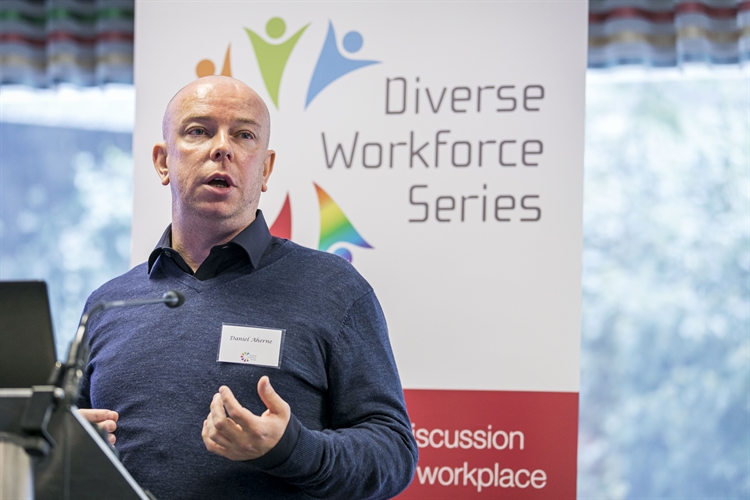Mon 16 Mar 2020

Dan Aherne has worked in neurodiversity in a workplace context for over 15 years, having spent much of his career with the National Autistic Society’s employment team and as a Disability Adviser at St Georges University.
In 2016, Daniel founded Adjust to provide organisations with clear, positive and practical training and consultancy around neurodiversity in the workplace. Since setting up Adjust, he has worked with many high-profile employers including the CIPD, EY, HS2, TK Maxx, BNP Paribas and the Bank of England.
At our recent ‘Managing Disability in the Workplace’ event, where he was speaking on neurodiversity, Dan kindly answered a couple of our questions about his insights on neurodiversity, and what initially prompted his involvement.
What originally brought you into the diversity and inclusion space?
When I was younger, I wanted to be a social worker and was advised to do some volunteering. This was twenty years ago now. I said no at first because the idea of volunteering didn’t initially appeal to me. Soon afterwards, however, there was a notice board at college with an ad that said, ‘come and volunteer with our autistic child on his play scheme’. That was the beginning -- I never became a social worker and stayed working in this space instead.
What was it about autism in particular that captured your attention?
I think I found autism so engaging because I had never met people who think so differently. I’d grown up around people who were similar to me, and then you meet someone who is autistic and his family. I could see that the context was different, but I could also really understand the perspective of the little boy whom I was working with, which grew a passion in me.
Why do you consider neurodiversity to be a pertinent workplace issue?
Neurodiversity is something that affects all of us – it’s estimated that 15% of the workforce could be neurodivergent in some way, but if you expand that and think about how many people have children, relations or friends who have ADHD, dyslexia, dyspraxia… Whenever I speak in workplaces, I think the instance of neurodiversity is so much higher than we actually think and everybody can relate to it in some way. When I started working in neurodiversity and helping people with autism into jobs, I was struck by how you could really see the different abilities of the people we worked with. It’s only now I think that workplaces are starting to embrace it, however.
It’s also remarkable that the workplace adjustments that are made for the neurodiverse population are actually just good for everyone. I was recently facilitating some training with a large company and was advising senior management was that, for assessment centres, they should ensure to make clear where it will take place, what time it will start, and what the assessment activities are. Sometimes instructions or information aren’t very clear and better communication would ultimately benefit everyone.
How has neurodiversity awareness changed since you first began working within this space?
When I first began working in neurodiversity, organisations only really interacted with the autistic community through programmes such as corporate responsibility schemes, and there was a charitably-driven approach. I do feel now, however, that organisations are embracing neurodiversity because they realise it will benefit their productivity. In my opinion, however, workplaces should simply represent and reflect broader society more generally. Whilst we are currently talking about the additional skills which neurodivergent individuals can add to a workplace, maybe we’ll look back in thirty years and the common sense will be that workplaces should represent populations and customers more generally regardless of the business case.
What’s the most important piece of advice you would give to a business seeking to become more neurodiverse?
Advice which was given to me on my first day at the National Autistic Society about working with autistic people was that if you promise something, deliver it. That should apply to all of the conditions which I speak about – ADHD, dyslexia, dyspraxia. Again, this should really be the standard for everyone, however; organisations should foster a culture of reliability, and do what they say they are going to do.
What’s the greatest change you would like to see for neurodiversity in workplaces?
Greater acceptance of people being different would make a huge difference. I was once visiting an organisation which has successfully embraced neurodiversity, and who are quite prominent employers of people who are neurodivergent. When someone skipped into reception with no shoes and socks on, no one batted an eyelid. Neurodiversity plays a large role in this organsiation’s ability to carry out its function as an organisation, and they evidently realise and accept that neurodiverse people may act differently. If there was wider acceptance of there being different ways of thinking and of doing things, organisations would be better places to work, and much more effective overall.
Dan will be speaking on the topic of neurodiversity at our upcoming 'Neurodiversity in the Workplace: Thinking Differently & Supporting Unique Talents' events, taking place in London on 10th September and in Manchester on 28th October, and at the Dods D&I Annual Conference, taking place in London on 8th December.
View all news